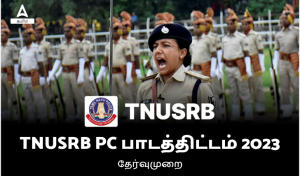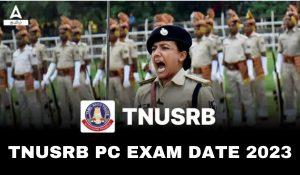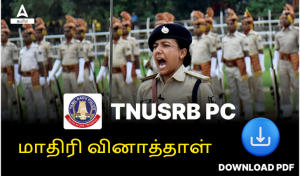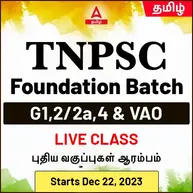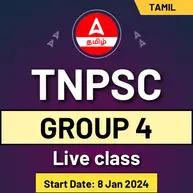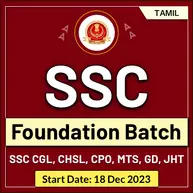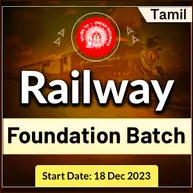
TNPSC Group 1, TNPSC Group 2/2A, TNPSC Group 4, TNUSRB, TNFUSRC, IBPS, SSC, IBPS RRB, SBI, RRB மற்றும் பிற போட்டித் தேர்வுகளுக்கான கேள்வி-பதில்கள்.
Q1. பின்வரும் அறிக்கைகளை ஆராயுங்கள்
- 2005 இல் இந்திய குடியுரிமைச் சட்டத்தை (1955) திருத்தியதன் மூலம் வெளிநாடு வாழ் இந்திய குடிமகன் திட்டம் அறிமுகப்படுத்தப்பட்டது.
- வெளிநாடு வாழ் இந்திய குடிமகன் (OCI) அட்டைதாரர்களுக்கு அரசியல் உரிமைகள் வழங்கப்படுகின்றன.
மேலே கொடுக்கப்பட்ட கூற்றுகளில் எது/எவை சரியானது ?
(a) 1 மட்டுமே
(b) 2 மட்டுமே
(c) 1 மற்றும் 2 இரண்டும்
(d) 1 அல்லது 2 இரண்டும் அல்ல
Q2. ஊதியம் நல்கும் பதவி தொடர்பான பின்வரும் அறிக்கைகளை ஆராயுங்கள்
- ஊதியம் நல்கும் பதவி என்பது அலுவலக உரிமையாளருக்கு சில நிதி ஆதாயங்களைக் கொண்டுவரும் ஒரு நன்மை, அத்தகைய இலாபத்தின் அளவு முக்கியமற்றது.
- இந்திய அரசியலமைப்பின் 102 வது பிரிவு நேரடியாக ஊதியம் நல்கும் பதவியுடன் தொடர்புடையது.
மேலே கொடுக்கப்பட்ட கூற்றுகளில் எது/எவை சரியானது ?
(a) 1 மட்டுமே
(b) 2 மட்டுமே
(c) 1 மற்றும் 2 இரண்டும்
(d) 1 அல்லது 2 இரண்டும் அல்ல
Q3. கிராம நியாயாலயஸ் சட்டம், 2008 தொடர்பான பின்வரும் அறிக்கைகளை ஆராயுங்கள்
- அந்தந்த உயர்நீதிமன்றத்துடன் முறையான ஆலோசனையின் பின்னர், ஒன்று அல்லது அதற்கு மேற்பட்ட நயலாய்களை அமைப்பதற்கான அதிகாரம் மாநில அரசுகளுக்கு வழங்கப்பட்டுள்ளது.
- முதல் வகுப்பு நீதித்துறை நீதவான் தேவைகள் மற்றும் தகுதிகளை பூர்த்தி செய்வதன் மூலம் உயர்நீதிமன்றத்துடன் கலந்துரையாடிய பின்னர் மாநில அரசு, நியாதிகாரி என நியமிக்கப்பட்ட கிராமப்புற மொபைல் நீதிமன்றங்களின் தலைமை அதிகாரியை நியமிப்பதை இந்த சட்டம் குறிப்பிடுகிறது. மேலே கொடுக்கப்பட்ட கூற்றுகளில் எது எது/எவை சரியானது ?
(a) 1 மட்டுமே
(b) 2 மட்டுமே
(c) 1 மற்றும் 2 இரண்டும்
(d) 1 அல்லது 2 இரண்டும் அல்ல
Q4. பாராளுமன்றக் குழுக்கள் தொடர்பான பின்வரும் அறிக்கைகளைக் கவனியுங்கள்?
- இது சபையால் நியமிக்கப்பட வேண்டும் அல்லது தேர்ந்தெடுக்கப்பட வேண்டும் அல்லது சபாநாயகர் / தலைவரால் பரிந்துரைக்கப்பட வேண்டும்.
- இது சபாநாயகர் / தலைவரின் வழிகாட்டுதலின் கீழ் செயல்பட வேண்டும்.
- இதற்கு லோக்சபா / ராஜ்யசபா வழங்கிய செயலகம் இருக்க வேண்டும்.
மேலே கொடுக்கப்பட்ட கூற்றுகளில் எது/எவை சரியானது ?
(a) 1 மட்டுமே
(b) 2 மட்டுமே
(c) 2 மற்றும் 3
(d) 1, 2 மற்றும் 3
Q5. அடிப்படைக் கடமைகள் தொடர்பான பின்வரும் அறிக்கைகளைக் கவனியுங்கள்
- பலவீனமான பிரிவுகளை சமூக அநீதியிலிருந்து பாதுகாக்க
- நாட்டைப் பாதுகாக்கவும், அவ்வாறு செய்ய அழைக்கப்படும்போது தேசிய சேவையை வழங்கவும்
- பொது சொத்துக்களைப் பாதுகாத்தல் மற்றும் வன்முறையைத் தவிர்ப்பது
மேலே கொடுக்கப்பட்ட கூற்றுகளில் எது சரியானது?
(a) 1 மற்றும் 2
(b) 2 மற்றும் 3
(c) 1 மற்றும் 3
(d) 1, 2 மற்றும் 3
Q6. 102 வது அரசியலமைப்பு திருத்தச் சட்டம், 2018 தொடர்பான பின்வரும் அறிக்கைகளை கவனியுங்கள்:
- சமூக மற்றும் கல்வி ரீதியாக பின்தங்கிய வகுப்பினருக்கான ஆணையம் பின்தங்கிய வகுப்புகளுக்கான தேசிய ஆணையம் என்று அறியப்படுவதற்கான ஏற்பாடுகளை அது செய்தது.
- இது இந்திய அரசியலமைப்பில் 338 B மற்றும் 342 A ஆகிய இரண்டு புதிய சரத்துகளை உருவாக்கியது.
மேலே கொடுக்கப்பட்ட கூற்றுகளில் எது/எவை சரியானது ?
(a) 1 மட்டும்
(b) 2 மட்டும்
(c) 1 மற்றும் 2 இரண்டும்
(d) 1 அல்லது 2 இரண்டும் அல்ல
Q7. அவசர சட்டம் பற்றி பின்வருவனவற்றைக் கருத்தில் கொண்டு தவறான அறிக்கை / விருப்பத்தை அடையாளம் காணவும்:
(a) வேறு எந்த சட்டத்தையும் போன்ற ஒரு அவசர சட்டத்தை மறுபரிசீலனை செய்ய முடியாது.
(b) ஒரு அவசர சட்டம் பாராளுமன்றத்தின் எந்தவொரு செயலையும் அல்லது மற்றொரு அவசர சட்டத்தையை மாற்றவோ அல்லது ரத்து செய்யவோ முடியும்.
(c) ஒரு அவசர சட்டம் வரிச் சட்டத்தையும் மாற்றலாம் அல்லது திருத்தலாம்.
(d) அரசியலமைப்பை திருத்துவதற்கு ஒரு அவசர சட்டம் பிறப்பிக்க முடியாது.
Q8. இந்திய அரசு சட்டம், 1919 தொடர்பான பின்வரும் அறிக்கைகளை கவனியுங்கள்
- மாகாணங்களின் நிர்வாக அரசாங்கத்தில் இரட்டை ஆட்சி முறை அறிமுகம் அறிமுகப்படுத்தப்பட்டது
- முஸ்லிம்களுக்கு தனி வகுப்புவாத வாக்காளர்களை அறிமுகப்படுத்துவது முதல் முறையாக அறிமுகப்படுத்தப்பட்டது
- மாகாணங்களுக்கு மையத்தால் சட்டமன்ற அதிகாரப் பகிர்வு அறிமுகப்படுத்தப்பட்டது.
மேலே கொடுக்கப்பட்ட கூற்றுகளில் எது/எவை சரியானது ?
(a) 1 மட்டுமே
(b) 1 மற்றும் 3
(c) 2 மற்றும் 3
(d) 3 மட்டும்
Q9. தேசிய மனித உரிமைகள் ஆணையச் சட்டம், 1993 இன் படி, பின்வருபவரில் அதன் தலைவராக யார் இருக்க முடியும்?
(a) உச்சநீதிமன்றத்தின் எந்தவொரு நீதிபதியும்
(b) உயர்நீதிமன்றத்தின் எந்தவொரு நீதிபதியும்
(c) இந்தியாவின் ஓய்வுபெற்ற தலைமை நீதிபதி மட்டுமே
(d) உயர் நீதிமன்றத்தின் ஓய்வு பெற்ற தலைமை நீதிபதி மட்டுமே
Q10. இந்திய அரசியலமைப்பின் ஏழாவது அட்டவணையில், பின்வரும் உள்ளீடுகளில் எது பொது பட்டியலில் சேர்க்கப்பட்டுள்ளது?
- தொழிலாளர்
- நிலம்
- கல்வி
- காடுகள்
- விவசாயம்
கீழே இருந்து சரியான குறியீட்டைத் தேர்ந்தெடுக்கவும்:
(a) 3 மட்டும்
(b) 1, 2 மற்றும் 5
(c) 1 மற்றும் 4
(d) 1, 3 மற்றும் 4
To Attempt the Quiz on APP with Timings & All India Rank,
Download the app now, Click here
Solutions
S1.Ans.(a)
Sol.
The Overseas Citizenship of India (OCI) Scheme was introduced by amending the Citizenship Act, 1955 in August 2005. The Scheme was launched during the Pravasi Bharatiya Divas Convention 2006 at Hyderabad.
OCI is not to be misconstrued as ‘dual citizenship. OCI does not confer political rights. The registered Overseas Citizens of India shall not be entitled to the rights conferred on a citizen of India under Article 16 of the Constitution with regard to equality of opportunity in matters of public employment.
https://www.mea.gov.in/overseas-citizenship-of-india-scheme.htm
S2.Ans.(c)
Sol.
An office of profit has been interpreted to be a position that brings to the office-holder some financial gain or benefit and the amount of such profit is immaterial.
Under the provisions of Article 102 and Article 191 of the Constitution, an MP or an MLA is barred from holding any office of profit under the central or state government.
https://www.prsindia.org/theprsblog/explained-law-holding-%E2%80%98office-profit%E2%80%99
S3.Ans.(c)
Sol.
Section 3 of the Gram Nyayalayas Act, 2008 provides for the establishment of gram nyayalayas. The State governments have been vested with the authority of setting up one or more nyayalayas, after proper consultation with the respective High Court, in every Panchayat at the intermediate level or group of adjacent Panchayats at the intermediate level of a district
Section 5 of the Gram Nyayalayas Act, 2008 lays down the appointment of the presiding officer of the rural mobile courts, designated as Nyayadhikari, by the State Government after deliberation with the High court. Section 6 of the Act requires the Nyayadhikari to fulfill the requirements and qualifications of a First class Judicial Magistrate and provides for proper reservation of the marginalized, women, the Scheduled Tribes, and Scheduled Castes for the post.
S4.Ans.(d)
Sol.
A parliamentary committee means a committee that:
- Is appointed or elected by the House or nominated by the Speaker / Chairman
- Works under the direction of the Speaker / Chairman
- Presents its report to the House or the Speaker / Chairman
- Has a secretariat provided by the Lok Sabha / Rajya Sabha
S5.Ans.(b)
Sol.
To protect the weaker sections from social injustice is a directive under DPSP under Part IV under article 46.hence statement 1 is incorrect
Statement 2 and 3 are fundamental duties.
S6.Ans.(c)
Sol.
The 102nd Constitution Amendment Act, 2018 inserted the following articles:
“338B. (1) There shall be a Commission for the socially and educationally backward classes to be known as the National Commission for Backward Classes.
“342A. (1) The President may with respect to any State or Union territory, and where it is a State, after consultation with the Governor thereof, by public notification, specify the socially and educationally backward classes which shall for the purposes of this Constitution be deemed
to be socially and educationally backward classes in relation to that State or Union territory, as the case may be.
∎ In article 366 of the Constitution, after clause (26B), the following clause shall be inserted, namely: — ‘(26C) “socially and educationally backward classes” means such backward classes as are so deemed under Article 342A for the purposes of this Constitution;’.
∎ The National Commission for Backward Classes (NCBC) has the authority to examine complaints and welfare measures regarding socially and educationally backward classes.
∎ The Act provides for powers and functions of NCBC.
S7.Ans.(a)
Sol.
Article 123 of the Constitution empowers the President to promulgate ordinances during the recess of Parliament. These ordinances have the same force and effect as an act of Parliament but are like temporary laws.
The ordinance-making power is the most important legislative power of the President. It has been vested in him to deal with unforeseen or urgent matters.
An ordinance like any other legislation can be retrospective, that is, it may come into force from a backdate. It may modify or repeal any act of Parliament or another ordinance. It can alter or amend a tax law also. However, it cannot be issued to amend the Constitution.
S8.Ans.(b)
Sol.
Statement 1 and 3 are correct
Popularly known as Montague-Chelmsford Reforms provided for the first time Diarchy at provinces which meant Dual Government in the Provincial subjects of administration were to be divided into two categories — “Transferred” and “Reserved”.
It also provided devolution of legislative authority by the center in provinces and devolution meant Rules and subjects of administration were divided into two categories -“Central” and “Provincial”. Subjects of all-India importance (like Railways, Finance) were brought under the category of Central, while matters relating to the administration of the provinces were classified as provincial.
Statement 2 is incorrect
The Indian Council act 1909 introduced separate communal electorates for Muslims for the first time
S9.Ans.(c)
Sol.
According to NHRC Act 1993, only a retired CJI can become chairman of NHRC, appointed by President on the recommendation of a committee comprising of PM, Speaker of Lok Sabha, Home Minister, Leader of Opposition of both Houses of Parliament, and Deputy Chairman of Rajya Sabha
S10.Ans.(d)
Sol.
The Seventh Schedule of the Constitution divides the legislative power of the Union and States. There are three Lists in the Seventh Schedule.
Union List enumerates the subjects upon which the Parliament can make laws.
State List specifies subjects upon which the State Legislature can make laws. Concurrent List provides subjects upon which both the Parliament and State Legislature can make laws. Labour, Forests and Education are subjects included in the Concurrent List. Land and Agriculture are entries mentioned in the State List
Use Coupon code: HAPPY (75% offer)
*இப்போது உங்கள் வீட்டில் தமிழில் நேரடி வகுப்புகள் கிடைக்கின்றன*
*பயிற்சி மட்டுமே தேர்வுர உங்களுக்கு உதவ முடியும் | Adda247 தமிழ் மூலம் உங்கள் பயிற்சியை இப்போது தொடங்கவும்*

